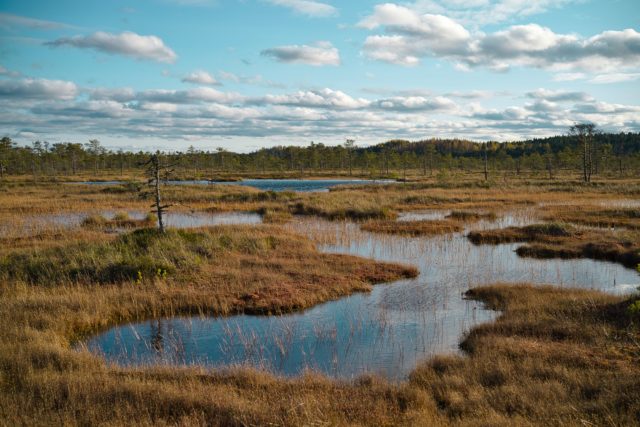WaterLANDS: New European Green Deal Project Launched to Lead Largescale Restoration of European Wetlands
An ambitious project has been launched to tackle largescale restoration of Europe’s wetlands, with €23 million of funding from the EU Horizon 2020 Programme Green Deal. WaterLANDS (′Water-based solutions for carbon storage, people and wilderness′) will restore wetland sites across Europe which have been decimated by human activity and lay the foundations for scalable protection across much wider areas.

WaterLANDS will undertake hands-on restoration of specific wetland sites, covering an initial 10,500 ha, and create best practice models that can be applied to wetland restoration at other sites. By engaging with local communities and stakeholders, the project will ensure that wetland restoration results not only in environmental gains, but also social and economic benefits for the communities involved.
The five-year project is led by University College Dublin (UCD), Ireland and brings together 31 other organisations from research, industry, government and non-profit sectors in 14 European countries.
Commenting on the project’s significance, WaterLANDS project coordinator Dr Craig Bullock, Research Fellow in Planning and Environmental Policy at University College Dublin, said:
“Previous attempts at wetland restoration have often been too localised or too fragmented to make a significant difference to the re-establishment of wetland ecosystems and species. In WaterLANDS, we aim to co-create a more effective means of restoration which captures ecological, social, governance and financial aspects, to connect habitats and communities across Europe, ensuring both thrive for many generations to come.”
Comprised of diverse ecosystems including peatlands, fens, riparian marshes and coastal estuaries, wetlands are home to 40% of the world’s species. They also store and capture carbon, remove environmental pollutants, and protect communities from flooding. Wetlands are particularly vulnerable to damage from human activities. Europe has already lost up to 90% of its original wetlands, resulting in massive biodiversity loss, water and food shortages, devastating floods and fires, coastal subsidence and erosion. The largescale, integrated approach developed in WaterLANDS will address these challenges to ensure the resilience and health of both wetland habitats and the communities who rely on them.
Funding for WaterLANDS is part of the European Commission’s Green Deal ambition to make Europe the first climate neutral continent by 2050 with a sustainable economy that leaves no one behind.
The project will officially launch in December 2021. Please follow @WaterLANDS_EU for the latest updates.
About WaterLANDS
- Project website (coming soon): www.waterlands.eu
- Follow us on Twitter: @WaterLANDS_EU
Contact
- Project Coordinator: Craig Bullock (craig.bullock@ucd.ie), Shane McGuinness (shane.mcguinness@ucd.ie)
- Project Communications: Jane Maher (jane@erinn.eu)
WaterLANDS Partners
- University College Dublin (Ireland)
- NUI Galway (Ireland)
- National Parks and Wildlife Service (Ireland)
- Community Wetlands Forum (Ireland)
- ERINN Innovation Ltd. (Ireland)
- Prospex Institute (Belgium)
- WWF Bulgaria (Bulgaria)
- Balkani Wildlife Society (Bulgaria)
- Tartu University (Estonia)
- Estonian Fund for Nature (Estonia)
- Estonian State Forest Management Centre (Estonia)
- AS Tootsi Turvas (Estonia)
- University of Eastern Finland (Finland)
- Geological Survey of Finland (Finland)
- Plan Bleu (France)
- Tour du Valat (France)
- Succow Foundation (Germany)
- Ca’ Foscari, University of Venice (Italy)
- We are here Venice (Italy)
- Wageningen University (Netherlands)
- Wetlands International (Netherlands)
- Radboud University Nijmegen (Netherlands)
- Provincie Groningen (Netherlands)
- Staatsbosbeheer (Netherlands)
- University of Warsaw (Poland)
- Estacion Biologica Doñana – CSIC (Spain)
- Uppsala University (Sweden)
- Natural England (United Kingdom)
- IUCN-UK Peatland Programme (United Kingdom)
- University of Leeds (United Kingdom)

Geological Survey of Finland: Solutions to accelerate the transition to a sustainable, carbon-neutral world
The Geological Survey of Finland (GTK) produces impartial and objective research data and services in support of decision-making in industry, academia, and wider society to accelerate the transition to a sustainable, carbon-neutral world. GTK employs more than 400 experts specializing in the mineral economy, circular economy, solutions related to energy, water and the environment, as well as digital solutions. GTK is a research institution governed by the Finnish Ministry of Employment and the Economy, operating in Finland and globally.
www.gtk.fi/en
